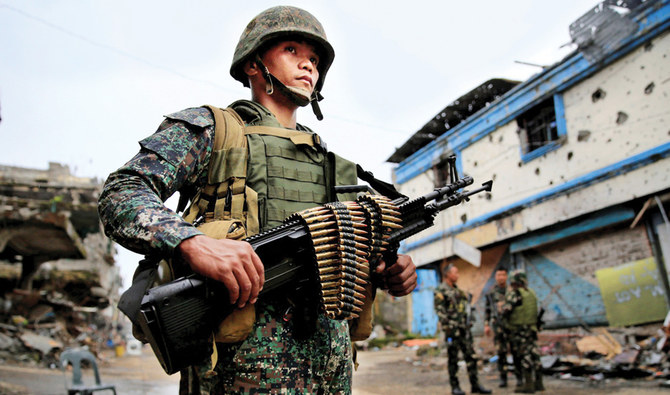JOLO, Sulu: Former fighters from one of the most dangerous militant outfits in the Philippines have claimed that they no longer believed their fight was worth it. They were speaking as local army officers report a fall in the number of active members in the organisation, the Abu Sayyaf Group.
The ASG was formed in 1991 as a splinter group of the Moro National Liberation Front, which seeks autonomy for Filipino Muslims in the southern Philippines. Initially influenced by Al-Qaeda, since the early 2000s it has been notorious for assassinations, extortion and kidnappings — often beheading hostages if a ransom was not paid. Often described as a criminal gang whose activity is more profit-driven than ideological, ASG was behind many violent incidents between 2011 and 2018. In 2014, some of its factions pledged allegiance to Daesh.
There has been a decline in ASG-related incidents since 2017, following a five-month operation to reclaim the city of Marawi in the southern Philippines, where militants affiliated with Daesh had taken control, and the subsequent crackdown on the ASG leadership.
Since 2018, the Philippine government has stepped up programs designed to encourage ASG members to surrender.
Data from the 11th Infantry Division, a Philippine army unit designated to fight militancy in southwestern Sulu island — the stronghold of ASG — shows that the number of militants active in the area has decreased from about 300 in 2019 to an estimated 100.
In an interview at a military facility in Jolo, capital of Sulu province, former fighters who are cooperating with the army spoke to Arab News about why they left the organization.
“Our fight was leading us nowhere,” said Faizal Umadjadi, now 21, who joined ASG in 2012. According to the military, he was involved in at least four encounters with government troops, the first time in 2014. Many ASG recruits come from local communities where the militants have their hideouts.
“I ran away from home, I didn’t listen to my parents,” Umadjadi said.
Six years later, the decision to surrender came during one of his meetings with family. “My parents cried a lot, so I thought I wouldn’t go back (to ASG), because I felt sorry for them,” he said. “They said there is no chance that we (ASG) can beat the government and it’s leading us nowhere.”
Arab Abdulmain Yousoff, 29, said he also chose family over combat eventually. It took him 10 years to make the decision. Military documentation shows he was a sub-leader in the group. He claimed he was close to Radullan Sahiron — ASG’s leader and one of its first members, who remains at large with a $1 million bounty on his head. Yousoff joined the group in 2010, following a promise that he would earn money from kidnaping for ransoms. In ASG, he was responsible for transporting and guarding hostages. He was involved in nine operations against government forces. At the same time, his elder brother, a soldier, was fighting ASG.
“My mother had a stroke because of me,” he said. “When there was a war in Marawi, that’s when my mother started to become ill. My brother was fighting in Marawi. My family said ‘if you still want to see your mother alive, it’s up to you. If you don’t want to see her alive anymore, it’s still up to you.'”
For Bennajar Jalmaani, recruited at the age of 15 in 2014, it was the ASG’s brutality toward hostages that he said made him want to leave. He started in reconnaissance and organizing food supplies. Military records show he was also involved in combat and participated in four encounters with the army.
He was with the group when it abducted two Canadians, a Norwegian and a Filipina from the Holiday Oceanview Resort on the island of Samal in Davao del Norte in 2015. The hostages were later taken to the jungles of Jolo island. He was also there when the Canadians were decapitated in 2016, after $6.4 million in ransom was not paid.
“When they beheaded the hostages, that’s when I decided to get out,” he said. He surrendered last year and now makes charcoal for a living. Like others who gave up arms, he receives assistance from the government to keep his family. This week alone, nine ASG members followed in his footsteps, and surrendered to the Joint Task Force Sulu.
Col. Giovanni Franza, who leads the Army 1102nd Brigade which received them, said the decision showed they wanted to return to “normal lives.” “We in the government are here to help you live normally,” he added in a message to those who remain within the group. “Take this opportunity to return to the folds of the law.”

